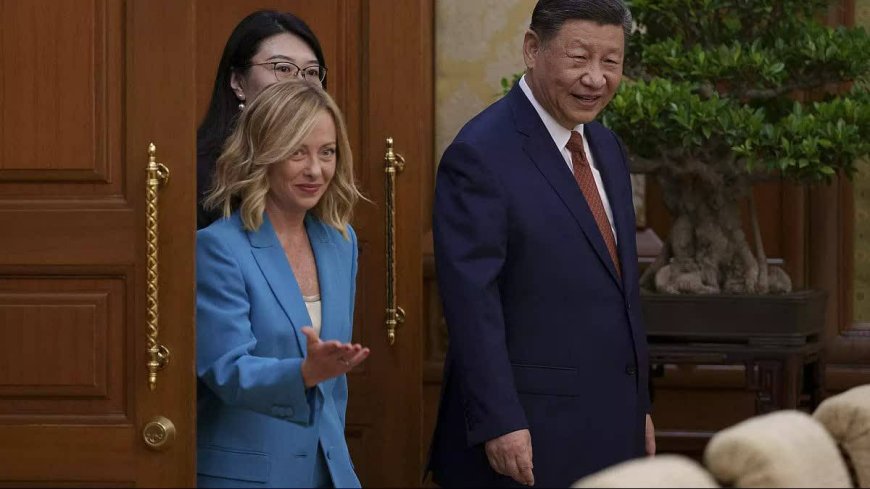Meloni's China Charm Offensive: Sino-Italian Rapprochement or Geopolitical Subterfuge?

By: A. Mahdavi
In a maneuver tinged with geopolitical intricacy and economic ambition, Italy’s Prime Minister Giorgia Meloni embarked on a five-day visit to China to forge a new three-year cooperation agreement. This visit follows Italy's controversial withdrawal from China’s Belt and Road Initiative (BRI) under intense pressure from the United States, making Italy the sole G7 member to retract its participation. Now, with renewed determination, Ms. Meloni seeks to mend and strengthen ties with Beijing.
The primary objective of Meloni's visit is to dispel the clouds of ambiguity and mistrust that shadowed Italy’s abrupt exit from the BRI last year. At that juncture, Ms. Meloni had asserted that the BRI was not advantageous for Italy, prompting the withdrawal. However, her current mission to Beijing signals an attempt to clarify these earlier contentions and rejuvenate bilateral relations, even though President Xi Jinping remains conspicuously absent from the meetings.
Ms. Meloni aims to secure agreements in strategic industries and renewable energy, envisioning an Italian investment exceeding $16 billion in China. Speaking at a bilateral economic forum, she underscored the expectation that China would share cutting-edge knowledge with its partners, thereby fostering mutual benefits from such collaboration. Throughout her visit, Meloni has prioritized economic relations over political considerations, despite Italy’s recent support for tariffs on Chinese electric car imports to the European Union. This stance illustrates Italy's delicate balancing act: aligning with European allies while simultaneously courting Chinese cooperation.
China's response to Italy’s overtures is pivotal. Will Beijing view Italy as a trustworthy partner despite the prior breach of agreement, or will it adopt a cautious stance shaped by Chinese cultural pragmatism? While China is eager to attract foreign investment in strategic sectors and new energy technologies, it remains skeptical about sharing its advanced knowledge with Italy. As a G7 and EU member, Italy has often opposed China’s moves, complicating trust. Yet, Beijing might still find value in Italy’s current right-wing administration, which could potentially align more closely with Chinese interests, thereby increasing Beijing’s leverage in Europe. Cooperation with Italy, alongside Serbia and Hungary, could significantly bolster China's influence on the continent.
Underlying Italy’s engagement with China is the lingering suspicion of Western espionage. The West is determined to curtail China's technological ascendancy, and Italy’s deeper integration could serve as a conduit for intelligence gathering. This dual role could enhance Italy’s bargaining power within the EU and G7, securing strategic advantages while placating Western allies. Thus, Italy's pragmatic approach—whether genuine collaboration or industrial espionage—could yield substantial dividends, positioning the country as a pivotal actor in European and transatlantic interactions.
For China, this partnership will be approached with vigilance. The coming three years of this cooperation agreement will serve as a testing ground, determining whether Beijing can expand its ties with Rome and solidify its foothold in Europe. Should this collaboration flourish, the United States might emerge as the principal loser, unless Italy’s involvement in China serves clandestine Western interests.
Italy’s calculated rapprochement with China underscores a nuanced strategy blending economic ambitions with geopolitical maneuvering. As Prime Minister Meloni navigates this complex terrain, the outcomes of Italy’s engagement will reverberate across the international stage, influencing the dynamics between Europe, China, and the United States. The world watches as Italy attempts to redefine its role amidst the power plays of global superpowers.













































